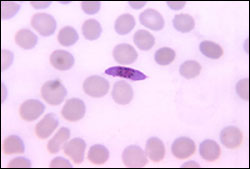Mosquitoes are more attracted to individuals infected with malaria

Mosquitoes are most attracted to children infected with malarial parasites in the gametocyte stage. The Anopheles mosquito ingests gametocytes during its blood meal. (CDC/ Dr. Mae Melvin)
Malaria remains a devastating problem in Africa and understanding the factors affecting its transmission remains a crucial part of the effort to combat the disease. A new study published in the premier open access journal PLoS Biology conducted in Western Kenya by Jacob Koella and colleagues now reveals that mosquitoes are more attracted to children with the infectious stages of malaria than to those infected with non-transmissible forms of the disease or to uninfected people.
The question of whether malaria increases your chances of being bitten by a mosquito has long stalled scientists because of numerous confounding factors. Sweat, breath odour, and high body temperature all increase mosquitoes¡¦ blood lust, and no previous study had been able to isolate the effect of just the parasite. To measure how attracted the mosquitoes were to the participants, the researchers set up a chamber of uninfected female mosquitoes surrounded by tents containing the children – one already infected with transmissible malaria, one infected with the non-transmissible asexual stage of the disease, and one with no infection. A device called an olfactometer wafted the odours of each participant towards the mosquitoes. Researchers measured which child most attracted the hungry bugs. Koella et al. found that individuals attracted significantly more mosquitoes if they had the infectious stage of the malaria parasite. Moreover, when the children were treated with antimalarial drugs, there was no difference in the subsequent attractiveness of the participants.
It is already known that mosquito biting rates greatly influence the spread of malaria. Now Koella and colleagues have shown that the parasite itself manipulates the biting behaviour of the mosquito vector when it is ready for a new host. Such manipulation could have a profound effect on the epidemiology of disease and, if it is not considered, could lead to severe biases in the estimates of the intensity of malaria transmission.
Media Contact
All latest news from the category: Health and Medicine
This subject area encompasses research and studies in the field of human medicine.
Among the wide-ranging list of topics covered here are anesthesiology, anatomy, surgery, human genetics, hygiene and environmental medicine, internal medicine, neurology, pharmacology, physiology, urology and dental medicine.
Newest articles

Superradiant atoms could push the boundaries of how precisely time can be measured
Superradiant atoms can help us measure time more precisely than ever. In a new study, researchers from the University of Copenhagen present a new method for measuring the time interval,…

Ion thermoelectric conversion devices for near room temperature
The electrode sheet of the thermoelectric device consists of ionic hydrogel, which is sandwiched between the electrodes to form, and the Prussian blue on the electrode undergoes a redox reaction…

Zap Energy achieves 37-million-degree temperatures in a compact device
New publication reports record electron temperatures for a small-scale, sheared-flow-stabilized Z-pinch fusion device. In the nine decades since humans first produced fusion reactions, only a few fusion technologies have demonstrated…





















